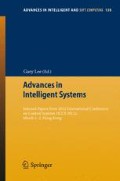Abstract
Array structure is adopted in adaptive array antenna of mobile base station, and the spatial cutting technique is used to divide the coverage area of base station into many differentiated small regions, improve utilizations of the system resources, reduce system interference and increase system capacity. This paper analyzes the space partitioning theory of adaptive array antenna signals, presents the traditional resource allocation algorithm of the adaptive array antenna area: resource fixed regional resource allocation algorithm and maximum and minimum regional resource allocation algorithm. Concerning problems existing in the traditional resource allocation algorithm of the adaptive array antenna area, the allocation algorithm for improvement of regional resources based on minimum standard deviation was put forward, and the principles of its regional resource allocation and calculation methods were introduced. Through simulation of call blocking rates for these three regional resource allocation algorithms, we can know that, the regional resource allocation algorithm of minimum standard deviation can reduce the call blocking rate compared with the traditional regional resource allocation algorithm, and the result in load balancing was best.
Access this chapter
Tax calculation will be finalised at checkout
Purchases are for personal use only
Preview
Unable to display preview. Download preview PDF.
References
Zhang, X., Li, H.: Applications of Minimum Mean Square Error Criterion in Radar Digital Beam Forming. Silicon Valley (13), 173–174 (2010)
Ma, Y., Hu, Y.: Performance Improvement of the CDMA System by Smart Antennas. Electronic Technology (02), 74–76 (2008)
Zhang, H., Qiu, X., Meng, L., Gao, Z., Zhang, X.: Independent Load Balancing Management Methods of TD-SCDMA Radio Access Network. Journal on Communications (01), 9–19 (2011)
Wu, Q., Xiao, Q.: Multi-antenna Technique Based on Wireless Channel Capacity Solution. Ship Science and Technology (04), 73–75 (2010)
Kuang, P., Wang, J.: A Kind of Improved Beamformer for Linear Constraints of Feature Space. Electronic Countermeasures (02), 38–41 (2009)
Kim, S., Varshney, P.K.: Adpative Fault Tolerant Bandwidth Management Framework for Multimedia Cellular Networks. IEEE Proceeding-Communications (10), 932–938 (2005)
Author information
Authors and Affiliations
Corresponding author
Editor information
Editors and Affiliations
Rights and permissions
Copyright information
© 2012 Springer-Verlag GmbH Berlin Heidelberg
About this paper
Cite this paper
Weihong, C., Junhua, L., Chaoyang, L., Jiebin, W. (2012). Regional Resource Allocation Algorithm and Simulation of the Adaptive Array Antenna. In: Lee, G. (eds) Advances in Intelligent Systems. Advances in Intelligent and Soft Computing, vol 138. Springer, Berlin, Heidelberg. https://doi.org/10.1007/978-3-642-27869-3_15
Download citation
DOI: https://doi.org/10.1007/978-3-642-27869-3_15
Publisher Name: Springer, Berlin, Heidelberg
Print ISBN: 978-3-642-27868-6
Online ISBN: 978-3-642-27869-3
eBook Packages: EngineeringEngineering (R0)

